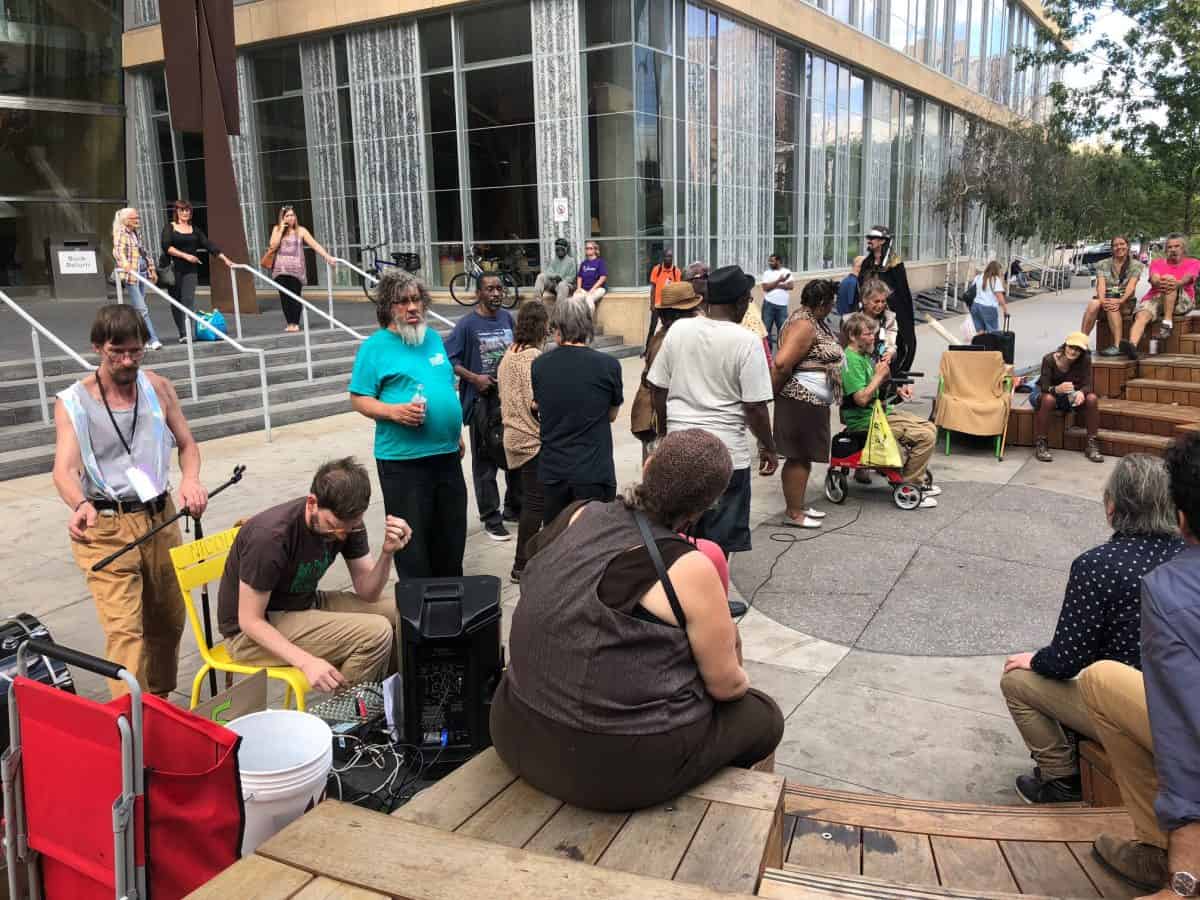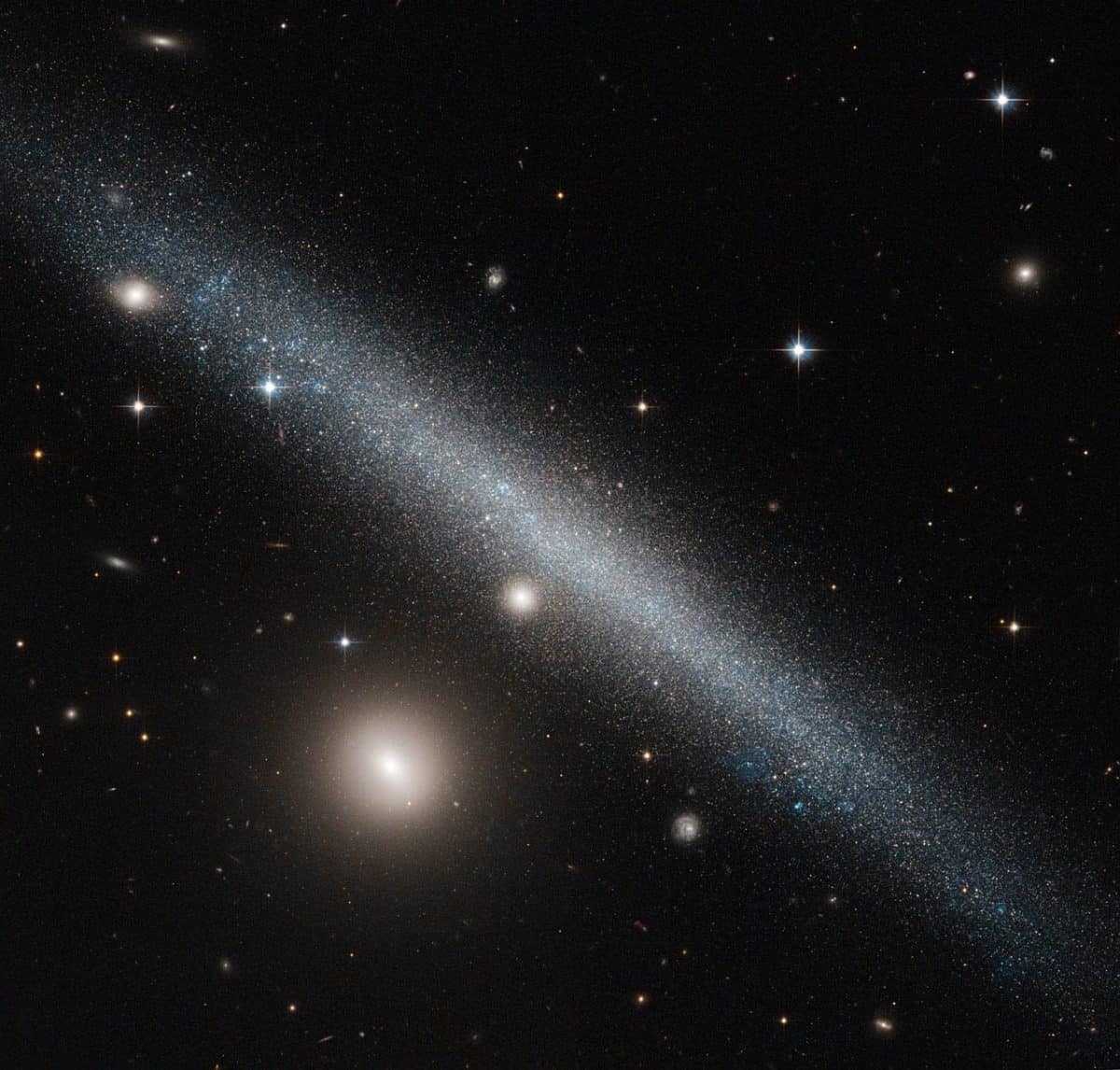Blog
Mozambique
more...https://www.youtube.com/watch?v=sVQDUvxL-0E
more...“Second Chance” zAmya theaters production with the Homeless Community. 4th and last performance at Minneapolis Downtown Library Friday 9-14-18 5pm.
Music by mick laBriola & Momoh Freeman.
Featuring music of The Coasters, Nina Simone, Allen Toussaint, Bob Marley, Otis Redding, The Meters, Fats Domino, Joe Zawinul, Louis Armstrong, Jimmy Cox, The Animals etc
more...Seen here from an edge-on perspective, UGC 1281 is a slightly warped dwarf galaxy with an apparent visual magnitude of 12.6.
It is located in the constellation of Triangulum, about 18 million light-years away from our Solar System.
The bright companion to the lower left of UGC 1281 is the small galaxy PGC 6700, also known as 2MASX J01493473+3234464.
Other prominent stars belonging to our own galaxy, the Milky Way, and more distant galaxies can be seen scattered throughout the sky.
The side-on view astronomers have of UGC 1281 makes it a perfect candidate for studies into how gas is distributed within galactic halos – an extended, roughly spherical component of a galaxy which extends beyond the main, visible component.
Astronomers have studied UGC 1281 to see how its gas vertically extends out from its central plane, and found it to be a quite typical dwarf galaxy.
However, it does have a slightly warped shape to its outer edges, and is forming stars at a particularly low rate.
more...Oliver Lake (born September 14, 1942) is an American jazz saxophonist, flutist, composer and poet. He is known mainly for alto saxophone but he also performs on soprano and flute.
During the 1960s Lake worked with the Black Artists Group in St. Louis. In 1977 he founded the World Saxophone Quartet with David Murray, Julius Hemphill, and Hamiet Bluiett. He has worked in the group Trio 3 with Reggie Workman and Andrew Cyrille. He is the father of drummer Gene Lake.
Lake has been a resident of Montclair, New Jersey.
more...Joseph Jarman (born September 14, 1937 in Pine Bluff, Arkansas), is a jazz musician, composer, and Shinshu Buddhist priest. He was one of the first members of the Association for the Advancement of Creative Musicians and a member of the Art Ensemble of Chicago.
Jarman grew up in Chicago, Illinois. At DuSable High School he studied drums with Walter Dyett, switching to saxophone and clarinet when he joined the United States Army after graduation.[1]During his time there, he was part of the 11th Airborne Division Band for a year.
After he was discharged from the army in 1958, Jarman attended Wilson Junior College, where he met bassist Malachi Favors Maghostut and saxophonists Roscoe Mitchell, Henry Threadgill, and Anthony Braxton. These men would often perform long jam sessions at the suggestion of their professor Richard Wang (now with Illinois University). Mitchell introduced Jarman to pianist Muhal Richard Abrams, and Jarman, Mitchell, and Maghostut joined Abrams’ Experimental Band, a private, non-performing ensemble, when that group was founded in 1961. The same group of musicians continued to play together in a variety of configurations, and went on to found the Association for the Advancement of Creative Musicians (AACM) in 1965, along with Fred Anderson and Phil Cohran.
https://www.youtube.com/watch?v=perVFDDy_xg
more...Israel López Valdés (September 14, 1918 – March 22, 2008), better known as Cachao (/kəˈtʃaʊ/ kə-CHOW), was a Cuban double bassist and composer. Cachao is widely known as the co-creator of the mambo and a master of the descarga (improvised jam sessions).[2] Throughout his career he also performed and recorded in a variety of music styles ranging from classical music to salsa. An exile in the United States since the 1960s, he only achieved international fame following a career revival in the 1990s.
Born into a family of musicians in Havana, Cachao and his older brother Orestes were the driving force behind one of Cuba’s most prolific charangas, Arcaño y sus Maravillas. As members of the Maravillas, Cachao and Orestes pioneered a new form of ballroom music derived from the danzón, the danzón-mambo, which subsequently developed into an international genre, mambo. In the 1950s, Cachao became famous for popularizing improvised jam sessions known as descargas. He emigrated to Spain in 1961, and moved to the United States in 1963, starting a career as a session and live musician for a variety of bands in New York during the rise of boogaloo, and later, salsa.
In the 1970s, Cachao fell into obscurity after moving to Las Vegas and later Miami, releasing albums sporadically as a leader. In the 1990s, he was re-discovered by actor Andy García, who brought him back to the forefront of the Latin music scene with the release of a documentary and several albums. Before his death in 2008, Cachao had earned a star on the Hollywood Walk of Fame and several Grammy Awards. He is ranked number 24 on Bass Player magazine’s list of “The 100 Greatest Bass Players of All Time”.
https://www.youtube.com/watch?v=tBIVgzDteAo
more...World Music on Flamenco Fridays with The Gypsy Kings prior to fame. Performing Fandango.
Fandango is a lively couples dance from Spain, usually in triple metre, traditionally accompanied by guitars, castanets, or hand-clapping (“palmas” in Spanish). Fandango can both be sung and danced. Sung fandango is usually bipartite: it has an instrumental introduction followed by “variaciones”. Sung fandango usually follows the structure of “cante” that consist of four or five octosyllabic verses (coplas) or musical phrases (tercios). Occasionally, the first copla is repeated.
Eighteenth century Castilianfandango dancers (by Pierre Chasselat) (1753–1814)
Fandango rhythm.
The meter of fandango is similar to that of the bolero and seguidilla. It was originally notated in 6/8 time, but later in 3/8 or 3/4.
The earliest fandango melody is found in the anonymous “Libro de diferentes cifras de guitarra” from 1705, and the earliest description of the dance itself is found in a 1712 letter by Martín Martí, a Spanish priest. The fandango’s first sighting in a theatrical work was in Francisco de Leefadeal‘s entremés “El novio de la aldeana” staged in Seville, ca. 1720. By the late 18th century it had become fashionable among the aristocracy and was often included in tonadillas, zarzuelas, ballets and operas, not only in Spain, but also elsewhere in Europe.
more...A runaway star lights the Flaming Star Nebula in this cosmic scene. Otherwise known as IC 405, the Flaming Star Nebula’s billowing interstellar clouds of gas and dust lie about 1,500 light-years away toward the constellation of Auriga. AE Aurigae, the bright star at upper left in the frame, is a massive and intensely hot O-type star moving rapidly through space, likely ejected from a collision of multiple star-systems in the vicinity of the Orion Nebula millions of years ago. Now close to IC 405, the high-speed star’s ionizing ultraviolet radiation powers the visible reddish glow as the nebula’s hydrogen atoms are stripped of their electrons and recombine. Its intense blue starlight is reflected by the nebula’s dusty filaments. Like all massive stars AE Aurigae will be short-lived though, furiously burning through its supply of fuel for nuclear fusion and exploding as a supernova. The colorful telescopic snapshot spans about 5 light-years at the estimated distance of the Flaming Star Nebula.
more...Douglas R. Ewart (born 1946 in Kingston, Jamaica) is a multi-instrumentalist and instrument builder. He plays sopranino and alto saxophones, clarinets, bassoon, flute, bamboo flutes (shakuhachi, ney, and panpipes), and didgeridoo; as well as Rastafarian hand drums (nyabingi, repeater, and bass).
Ewart emigrated to the United States in June 1963 (coming to Chicago) and became associated with the Association for the Advancement of Creative Musicians (AACM) in 1967, studying with Joseph Jarman and Roscoe Mitchell. He served as that organization’s president from 1979 to 1986.
He has performed or recorded with J. D. Parran, Muhal Richard Abrams, Art Ensemble of Chicago, Anthony Braxton, Alvin Curran, Anthony Davis, Robert Dick, Von Freeman, Joseph Jarman, Amina Claudine Myers, Roscoe Mitchell, James Newton, Rufus Reid, Wadada Leo Smith, Cecil Taylor, Richard Teitelbaum, Henry Threadgill, Hamid Drake, Don Byron, Malachi Favors Maghostut, and George Lewis.
He has lived in Minneapolis, Minnesota since 1990.
https://www.youtube.com/watch?v=gOiHdj9QMjg
more...Tony Russell “Charles” Brown (September 13, 1922 – January 21, 1999) was an American blues singer and pianist whose soft-toned, slow-paced blues-club style influenced blues performance in the 1940s and 1950s. He had several hit recordings, including “Driftin’ Blues” and “Merry Christmas Baby“.
Brown was born in Texas City, Texas. As a child he loved music and received classical music training on the piano. He graduated from Central High School in Galveston, Texas, in 1939 and Prairie View A&M College in 1942 with a degree in chemistry. He then became a chemistry teacher at George Washington Carver High School in Baytown, Texas, a mustard gas worker at the Pine Bluff Arsenal at Pine Bluff, Arkansas, and an apprentice electrician at a shipyard in Richmond, California, before settling in Los Angeles in 1943.
more...Leon Brown “Chu” Berry (September 13, 1908 – October 30, 1941) was an American jazz tenor saxophonist during the 1930s.
According to music critic Gary Giddins, musicians called him “Chu” because he chewed on the mouthpiece of his saxophone or because he had a Fu Manchu mustache.
Berry was born in Wheeling, West Virginia. He graduated from Lincoln High School, in Wheeling, then attended West Virginia State College for three years. His sister Ann played piano. Berry became interested in music at an early age, playing alto saxophone, at first with local bands. He was inspired to take up the tenor saxophone after hearing Coleman Hawkins on tour.
Most of Berry’s career was spent with swing bands: Sammy Stewart, 1929–1930, with whom he switched to tenor sax, Benny Carter, 1932–1933, Teddy Hill, 1933–1935, Fletcher Henderson, 1935–1937, Cab Calloway, his best-known affiliation, from 1937 to 1941.[3]
Throughout his brief career, Berry was in demand as a sideman for recording sessions under the names of various other jazz artists, including Spike Hughes (1933), Bessie Smith (1933), the Chocolate Dandies (1933), Mildred Bailey (1935–1938), Teddy Wilson (1935–1938), Billie Holiday (1938–1939), Wingy Manone (1938–1939) and Lionel Hampton (1939).
https://www.youtube.com/watch?v=RiN7lExwQu8
more...Niger, Africa
more...“Second Change”
zAmya Theaters production with the Homeless Community.
Performing schedule for upcoming week.
Music provided my mick laBriola and Momoh Freeman.
Tuesday Sept 11 noon Minneapolis Downtown Library
Wednesday Sept 12 noon Minneapolis Downtown Library
Thursday Sept 13 noon Minneapolis Downtown Library
Friday Sept 14 5pm Minneapolis Downtown Library
Saturday Sept 15 1pm Elliott Park
Wednesday Sept 19 730pm East Phillips Park
I Zwicky 18 is a dwarf irregular galaxy located about 59 million light years away in the constellation Ursa Major. The galaxy was first identified by Swiss astronomer Fritz Zwicky in a 1930s photographic survey of galaxies.
Studies at the Palomar Observatory some 40 years ago led astronomers to believe that the galaxy erupted with star formation billions of years after its galactic neighbors. Galaxies resembling I Zwicky 18’s youthful appearance are typically found only in the early universe. Early observations with the Hubble Space Telescope suggested an age of 500 million years old for I Zwicky 18.[4] The Hubble Space Telescope, however, later found faint, older stars contained within the galaxy, suggesting its star formation started at least one billion years ago and possibly as much as ten billion years ago. The galaxy, therefore, may have formed at the same time as most other galaxies.
Spectroscopic observations with ground-based telescopes have shown that I Zwicky 18 is almost exclusively composed of hydrogen and helium, the main ingredients created in the Big Bang. The galaxy’s primordial makeup suggests that its rate of star formation has been much lower than that of other galaxies of similar age. The galaxy has been studied with most of NASA’s telescopes, including the Spitzer Space Telescope, the Chandra X-ray Observatory, and the Far Ultraviolet Spectroscopic Explorer (FUSE). However, it remains a mystery why I Zwicky 18 formed so few stars in the past, and why it is forming so many new stars right now.
more...Maria Muldaur (born September 12, 1943) is an American folk and blues singer who was part of the American folk music revival in the early 1960s. She recorded the 1973 hit song “Midnight at the Oasis” and continues to record albums in the folk traditions.
She was the wife of musician Geoff Muldaur and is the mother of singer-songwriter Jenni Muldaur.
Muldaur was born Maria Grazia Rosa Domenica D’Amato in Greenwich Village, New York City, where she attended Hunter College High School.[2]
Muldaur began her career in the early 1960s as Maria D’Amato, performing with John Sebastian, David Grisman, and Stefan Grossman as a member of the Even Dozen Jug Band. She then joined Jim Kweskin & the Jug Band as a featured vocalist and occasional violinist. During this time, she was part of the Greenwich Village scene that included Bob Dylan, and some of her recollections of the period, particularly with respect to Dylan, appear in Martin Scorsese‘s 2005 documentary film No Direction Home.
more...“Papa” John DeFrancesco (born September 12, 1940) is an American jazz organist and vocalist, and father of Joey DeFrancesco and Johnny DeFrancesco.
Philadelphia, PA
more...William Alonzo “Cat” Anderson (September 12, 1916 – April 29, 1981) was an American jazz trumpeter known for his long period as a member of Duke Ellington‘s orchestra and for his wide range (more than five octaves), especially his playing in the higher registers.
Born in Greenville, South Carolina, Anderson lost both parents when he was four years old, and was sent to live at the Jenkins Orphanage in Charleston, where he learned to play trumpet. Classmates gave him the nickname “Cat” (which he used all his life) based on his fighting style. He toured and made his first recording with the Carolina Cotton Pickers, a small group based at the orphanage. After leaving the Cotton Pickers, Anderson played with guitarist Hartley Toots, Claude Hopkins‘ big band, Doc Wheeler’s Sunset Orchestra (1938–1942), with whom he also recorded, Lucky Millinder, the Erskine Hawkins Orchestra, Sabby Lewis‘s Orchestra, and Lionel Hampton, with whom he recorded the classic “Flying Home No. 2”.
more...More Posts
- Daily Roots with Prince Buster
- The Cosmos with R Aquarii
- Tomasz Stanko Day
- Clyde Bernhardt Day
- World Music with Diali Cissokho & Kaira Ba
- Daily Roots with Linval Thompson
- The Cosmos with NGC 3576
- Bela Fleck Day
- Lee Morgan Day
- Blind Boy Fuller Day
- World Music with Omar Bashir
- Daily Roots with Owen Gray
- The Cosmos with NGC 6300
- Mitch Mitchell Day
- Colin Bailey Day
- World Music with Combo Ginebra
- Daily Roots with Freddie McGregor
- The Cosmos with IRAS 23166+1655
- Jaimoe Day
- Louis Jordan Day




